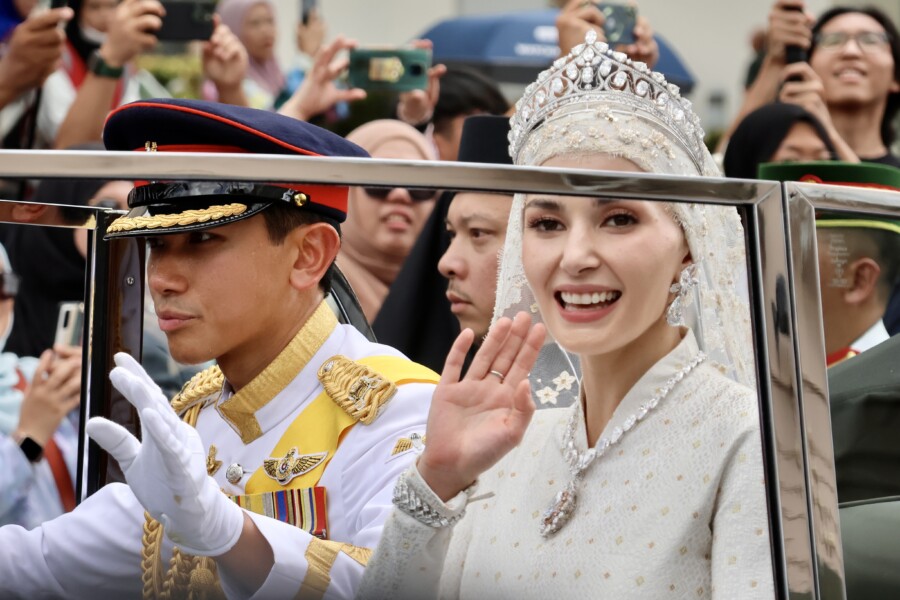China’s declining marriage and birth rates have become a concern for the Chinese Communist Party, which is now encouraging young men and women to marry and have children. The pressure to marry and have children is felt not only from parents but also from the government. However, many young Chinese are turning away from traditional choices due to a slowing economy, rising unemployment, and changing societal expectations. The Party’s attempts to incentivize marriage and childbearing, such as offering rewards for young brides or imposing cooling-off periods for couples seeking separation, have been met with criticism and resistance.
Experts argue that the predominantly male Chinese leadership fails to understand the motivations behind these choices, particularly for women. The Party’s efforts are seen as out-of-touch and superficial, and the officials themselves are often seen as not experiencing the same pressures. The singles population in China is divided into two groups: urban women and rural men. Rural men face economic expectations, such as high bride prices and the need for a secure job, while urban women struggle with societal expectations and the widening gap between their views on marriage and those of society.
Urban women, in particular, feel that they have more options now and that having children is no longer a mandatory task. They also note the unequal expectations placed on women and men in relationships, with women feeling burdened by the unequal division of household chores and parenting responsibilities. The Party, however, has not addressed these issues in its campaigns to promote marriage and childbearing.
Young Chinese are expressing their resistance to societal and government pressures, with many feeling that they are the “last generation” to face these expectations. The declining marriage and birth rates in China reflect a shift in societal values and priorities, with young people prioritizing personal fulfillment and individual choices over traditional expectations.
Original news source: China’s matchmaking mums have a powerful ally: The Party (BBC)
Listen
Slow
Normal
Fast
Group or Classroom Activities
Warm-up Activities:
– News Summary
Instructions: Students will work in pairs to summarize the main points of the article in their own words. They will then present their summary to the class, focusing on clarity and conciseness. This will help enhance their comprehension and summarizing skills.
– Opinion Poll
Instructions: Create a series of statements related to the article’s themes, such as “Government should not interfere with personal decisions like marriage and childbearing” or “Economic stability is essential before considering marriage.” Students will move around the room and poll their classmates, tallying agree/disagree responses. Afterwards, discuss the results as a class to practice expressing and justifying opinions.
– Vocabulary Pictionary
Instructions: Write down keywords from the article (e.g., “incentivize,” “resistance,” “societal expectations”). Students will take turns drawing the words on the board without speaking, while their classmates try to guess the words. This activity will reinforce new vocabulary and provide a fun way to review the article’s content.
– Pros and Cons
Instructions: Divide the class into two groups. Assign one group to list the pros and the other to list the cons of government policies encouraging marriage and childbirth, as mentioned in the article. Then, have a debate where each side presents their arguments, practicing persuasive language and critical thinking.
– Future Predictions
Instructions: Ask students to imagine the future implications of the trends mentioned in the article. They will write down their predictions about how Chinese society may change if current attitudes towards marriage and childbirth continue. Students will share their ideas with the class, using future tense structures and speculative language to discuss potential societal shifts.
Comprehension Questions:
1. What specific demographic trends are causing concern for the Chinese Communist Party?
2. What types of incentives or measures has the Party implemented to encourage marriage and childbearing?
3. What are some of the reasons young Chinese are hesitant to marry and have children?
4. How do experts view the Chinese leadership’s understanding of the motivations behind young people’s choices regarding marriage and childbearing?
5. What challenges do rural men face in the context of marriage and economic expectations?
6. What societal pressures do urban women in China face regarding marriage and childbearing?
7. How have the expectations for women and men in relationships contributed to the resistance against marriage and childbearing?
8. What shift in values and priorities is reflected in the declining marriage and birth rates among young Chinese people?
Go to answers ⇩
Listen and Fill in the Gaps:
China’s (1)______ marriage and birth rates have become a concern for the Chinese Communist Party, which is now encouraging young men and women to marry and have children. The pressure to marry and have children is felt not only from parents but also from the government. However, many young Chinese are (2)______ away from traditional choices due to a slowing economy, rising (3)______, and changing (4)______ expectations. The Party’s attempts to incentivize marriage and childbearing, such as offering rewards for young brides or imposing cooling-off periods for couples seeking separation, have been met with criticism and resistance.
(5)______ argue that the predominantly male (6)______ leadership fails to understand the motivations behind these choices, particularly for women. The Party’s (7)______ are seen as out-of-touch and superficial, and the officials themselves are often seen as not experiencing the same pressures. The singles (8)______ in China is divided into two groups: urban women and rural men. Rural men face (9)______ expectations, such as high bride prices and the need for a secure job, while urban (10)______ struggle with societal expectations and the widening gap between their views on marriage and those of society.
Urban women, in particular, feel that they have more options now and that having children is no longer a mandatory task. They also note the (11)______ expectations (12)______ on women and men in relationships, with women feeling burdened by the unequal division of household chores and parenting responsibilities. The Party, however, has not addressed these issues in its campaigns to (13)______ (14)______ and childbearing.
(15)______ Chinese are expressing their resistance to societal and government pressures, with many feeling that they are the “last generation” to face these expectations. The declining marriage and birth rates in China (16)______ a shift in societal values and priorities, with young people prioritizing personal fulfillment and individual choices over traditional expectations.
Go to answers ⇩
Discussion Questions:
Students can ask a partner these questions, or discuss them as a group.
1. What is your perception of the ideal age to get married in your culture, and how do you feel about it?
2. How would you feel if your government started incentivizing marriage and childbearing in your country?
3. Do you think the government should play a role in influencing personal decisions such as marriage and having children? Why or why not?
4. What are some of the pressures you think young people face when it comes to marriage and starting a family in your society?
5. How do you feel about the concept of a “bride price” and its implications on gender equality and economic pressure?
6. Do you like the idea of having children as a mandatory aspect of adult life? Why or why not?
7. Do you think the challenges faced by urban women regarding marriage and societal expectations are similar in your country? Can you provide an example?
8. What is your opinion on the importance of a secure job before getting married or starting a family?
9. How would you feel if there was a significant gender imbalance in your community affecting marriage prospects?
10. Do you think there should be cooling-off periods for couples seeking separation or divorce? Why or why not?
11. What is your stance on the unequal division of household chores and parenting responsibilities between genders?
12. How do you think a slowing economy and rising unemployment affect young people’s decisions about marriage and family?
13. Do you think the concept of being the “last generation” to face certain societal expectations is applicable to your society? Why or why not?
14. In what ways do you believe personal fulfillment and individual choices should be prioritized over traditional societal expectations?
15. How do you think societal values and priorities are changing in your own country with regard to marriage and family life?
Individual Activities
Vocabulary Meanings:
Match each word to its meaning.
Words:
1. declining
2. marriage
3. birth
4. Chinese
5. government
6. choices
7. societal
8. expectations
Meanings:
(a) Relating to China or its people
(b) Decisions or options that one can make
(c) The governing body of a country
(d) The act of getting married
(e) Relating to society or social norms
(f) Beliefs or assumptions about what should happen
(g) Decreasing or becoming less
(h) The act of giving birth to a child
Go to answers ⇩
Multiple Choice Questions:
1. What is the concern for the Chinese Communist Party regarding marriage and birth rates?
(a) Increasing rates
(b) Stable rates
(c) Unknown rates
(d) Declining rates
2. What are some factors that are causing young Chinese to turn away from traditional choices?
(a) Growing economy, decreasing unemployment, changing societal expectations
(b) Slowing economy, rising unemployment, stable societal expectations
(c) Slowing economy, rising unemployment, changing societal expectations
(d) Growing economy, decreasing unemployment, stable societal expectations
3. Why are the Party’s attempts to incentivize marriage and childbearing being criticized?
(a) Seen as out-of-touch and superficial
(b) Seen as effective and necessary
(c) Seen as understanding and supportive
(d) Seen as irrelevant and unnecessary
4. Who do experts argue fails to understand the motivations behind the choices of young Chinese?
(a) Predominantly female Chinese leadership
(b) Predominantly male Chinese leadership
(c) Both male and female Chinese leadership
(d) Experts do not mention any specific group
5. What are the two main groups within the singles population in China?
(a) Urban men and rural women
(b) Urban men and urban women
(c) Urban women and rural men
(d) Rural men and rural women
6. What are some of the challenges faced by rural men in China?
(a) Low bride prices and need for a secure job
(b) High bride prices and no need for a secure job
(c) Low bride prices and no need for a secure job
(d) High bride prices and need for a secure job
7. What are some of the challenges faced by urban women in China?
(a) Economic expectations and need for a secure job
(b) Societal expectations and widening gap between their views on marriage and those of society
(c) Societal expectations and need for a secure job
(d) Economic expectations and widening gap between their views on marriage and those of society
8. What do young Chinese prioritize over traditional expectations?
(a) Personal fulfillment and individual choices
(b) Societal expectations and government pressures
(c) Marriage and childbearing
(d) Economic expectations and job security
Go to answers ⇩
True or False Questions:
1. Experts argue that the predominantly female Chinese leadership fails to understand the motivations behind these choices, particularly for men.
2. Urban women feel that they have more options now and that having children is no longer mandatory.
3. China’s increasing marriage and birth rates are a concern for the Chinese Communist Party.
4. The Party’s attempts to discourage marriage and childbearing have been met with praise and acceptance.
5. Young Chinese are succumbing to societal and government pressures and prioritizing societal expectations over personal fulfillment and individual choices.
6. The slowing economy, rising unemployment, and changing societal expectations are causing young Chinese to turn away from traditional choices.
7. The government is pressuring young men and women to marry and have children.
8. The singles population in China is divided into two groups: urban women and rural men.
Go to answers ⇩
Write a Summary:
Write a summary of this news article in two sentences.
Check your writing now with the best free AI for English writing!
Writing Questions:
Answer the following questions. Write as much as you can for each answer.
Check your answers with our free English writing assistant!
1. What specific incentives has the Chinese Communist Party introduced to encourage marriage and childbearing, and what has been the public response to these measures?
2. How do the economic expectations for rural men differ from the societal expectations faced by urban women in China?
3. What reasons do experts give for the Chinese Communist Party’s failure to understand the motivations behind young Chinese people’s choices regarding marriage and childbearing?
4. In what ways do urban women in China perceive the expectations around marriage and childbearing to be unequal for men and women?
5. How does the concept of the “last generation” reflect the attitudes of young Chinese people towards government and societal pressures on marriage and childbearing?
Answers
Comprehension Question Answers:
1. What specific demographic trends are causing concern for the Chinese Communist Party?
The declining marriage and birth rates in China are causing concern for the Chinese Communist Party.
2. What types of incentives or measures has the Party implemented to encourage marriage and childbearing?
The Party has attempted to incentivize marriage and childbearing by offering rewards for young brides and imposing cooling-off periods for couples seeking separation.
3. What are some of the reasons young Chinese are hesitant to marry and have children?
Young Chinese are hesitant to marry and have children due to a slowing economy, rising unemployment, changing societal expectations, and concerns about the unequal division of household chores and parenting responsibilities.
4. How do experts view the Chinese leadership’s understanding of the motivations behind young people’s choices regarding marriage and childbearing?
Experts argue that the predominantly male Chinese leadership fails to understand the motivations behind these choices, particularly for women, and view the Party’s efforts as out-of-touch and superficial.
5. What challenges do rural men face in the context of marriage and economic expectations?
Rural men face economic expectations such as high bride prices and the need for a secure job.
6. What societal pressures do urban women in China face regarding marriage and childbearing?
Urban women in China face societal pressures and the widening gap between their views on marriage and those of society, along with the burden of unequal expectations in relationships.
7. How have the expectations for women and men in relationships contributed to the resistance against marriage and childbearing?
The unequal division of household chores and parenting responsibilities placed on women, compared to men, has contributed to the resistance against marriage and childbearing.
8. What shift in values and priorities is reflected in the declining marriage and birth rates among young Chinese people?
The declining marriage and birth rates among young Chinese people reflect a shift in societal values and priorities towards personal fulfillment and individual choices over traditional expectations.
Go back to questions ⇧
Listen and Fill in the Gaps Answers:
(1) declining
(2) turning
(3) unemployment
(4) societal
(5) Experts
(6) Chinese
(7) efforts
(8) population
(9) economic
(10) women
(11) unequal
(12) placed
(13) promote
(14) marriage
(15) Young
(16) reflect
Go back to questions ⇧
Vocabulary Meanings Answers:
1. declining
Answer: (g) Decreasing or becoming less
2. marriage
Answer: (d) The act of getting married
3. birth
Answer: (h) The act of giving birth to a child
4. Chinese
Answer: (a) Relating to China or its people
5. government
Answer: (c) The governing body of a country
6. choices
Answer: (b) Decisions or options that one can make
7. societal
Answer: (e) Relating to society or social norms
8. expectations
Answer: (f) Beliefs or assumptions about what should happen
Go back to questions ⇧
Multiple Choice Answers:
1. What is the concern for the Chinese Communist Party regarding marriage and birth rates?
Answer: (d) Declining rates
2. What are some factors that are causing young Chinese to turn away from traditional choices?
Answer: (c) Slowing economy, rising unemployment, changing societal expectations
3. Why are the Party’s attempts to incentivize marriage and childbearing being criticized?
Answer: (a) Seen as out-of-touch and superficial
4. Who do experts argue fails to understand the motivations behind the choices of young Chinese?
Answer: (b) Predominantly male Chinese leadership
5. What are the two main groups within the singles population in China?
Answer: (c) Urban women and rural men
6. What are some of the challenges faced by rural men in China?
Answer: (d) High bride prices and need for a secure job
7. What are some of the challenges faced by urban women in China?
Answer: (b) Societal expectations and widening gap between their views on marriage and those of society
8. What do young Chinese prioritize over traditional expectations?
Answer: (a) Personal fulfillment and individual choices
Go back to questions ⇧
True or False Answers:
1. Experts argue that the predominantly female Chinese leadership fails to understand the motivations behind these choices, particularly for men. (Answer: False)
2. Urban women feel that they have more options now and that having children is no longer mandatory. (Answer: True)
3. China’s increasing marriage and birth rates are a concern for the Chinese Communist Party. (Answer: False)
4. The Party’s attempts to discourage marriage and childbearing have been met with praise and acceptance. (Answer: False)
5. Young Chinese are succumbing to societal and government pressures and prioritizing societal expectations over personal fulfillment and individual choices. (Answer: False)
6. The slowing economy, rising unemployment, and changing societal expectations are causing young Chinese to turn away from traditional choices. (Answer: True)
7. The government is pressuring young men and women to marry and have children. (Answer: True)
8. The singles population in China is divided into two groups: urban women and rural men. (Answer: True)
Go back to questions ⇧















